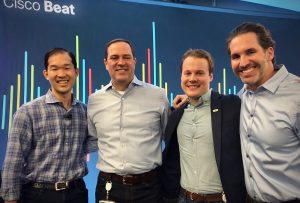Cisco is forging a new path with the founding of their new venture capital firm Decibel. Well-known for their efforts to keep the entrepreneurial spirit alive, the tech giant’s decision to go independent with their new investment firm aligns with their five pillars of innovations.
When newer, more nimble competition entered the tech market, the thirty-four-year-old Cisco refused to quietly go into the night and the pillars were created as a way to stay ahead of the curve. Both partnership and investment are key aspects of their strategy and that’s exactly what the tech giant is doing with Decibel.
Founding partner of Cisco’s newest venture is John Sakoda and he describes the blend of ‘invest’ and ‘partner’ in his own words: “Decibel is a new venture capital firm, and this is the first time a major tech company has started a VC firm from scratch as an independent entity to focus on accelerating enterprise innovation…[It] will execute its own investment strategy, fund operations, and portfolio management, all while still having unique access as a highly collaborative and aligned partner to Cisco.”
Decibel is open-minded about their investments but they want to focus on the enterprise and B2B landscape. Little of what Sakoda is looking at right now overlaps with Cisco’s current offerings but they are forward-looking. While there may be some strategic benefit to the newly software-focused company down the line, there is no specific impetus to invest in technology within a certain sphere of corporate influence.
The firm successfully raised its first fund of $500 million and Sakoda is busy shopping around for promising new companies in need of seed and series A-stage funding. He is keen to write checks ranging from $5 to $15 million and many of their initial investments are creating security, networking, datacenter, cloud and collaboration technologies.
“We’re really going to be looking for startups trying to find a product market fit and help with how to grow,” Sakoda explained. “If a company has lots of revenue and is already scaling, it’s probably too late for us.”
The firm has also set itself apart by positioning themselves as a “long term partner” to portfolio companies. The VC will likely have the resources necessary to see a company through to its full potential – usually between 5 to 10 years.
Decibel publicly launched in March 2019 and while they have the flexibility of a small venture capital firm, they also benefit from Cisco’s global network and wealth of resources. Jon Oberheide is one such example. He sold his company, Duo Security, to Cisco for $2 billion last year and is acting as an advisor to one of Decibel’s portfolio companies this year.
In fact, Oberheide is working with over half of the venture capital firm’s current assets, including Vancouver-based cybersecurity start-up CMD. Decibel is also backing a software company called Blameless who offers a site reliability engineering platform for developers. This early stage venture recently raised $20 in funding led by Lightspeed Venture Partners.
“The VC industry is relatively young, it’s only a few decades old, and it’s going through its own transformation,” Sakoda said. “We are unlocking the potential of great companies like Cisco and helping to bring that to entrepreneurs. If we do that successfully, ten years from now companies will view it as a model for how large companies like Cisco should be partnering with the startup community.”
























